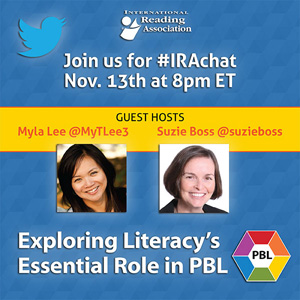
New teaching styles and ideas are constantly implemented in the classroom and it can be a challenge to find what works and how to fit it all in. Thursday’s #IRAchat will answer questions focused on literacy's role in Project-Based Learning (PBL) with experts Myla Lee, a PBL specialist with Technology Integration for Novi Community Schools in Michigan, and Suzie Boss, author of Bringing Innovation to School and Reinventing Project-Based Learning, both from the Buck Institute for Education (BIE).
“In PBL, students take on the role of inquirer. Instead of relying on the teacher to inform them what's important to understand, they ask questions to determine their own ‘need to know,’” Boss said. “As a result, students see how literacy skills help them to make meaning of social studies, science, math, art, and other content areas.”
Literacy in PBL empowers students to collaborate with one another, plan, and critique projects while receiving feedback the BIE experts said. Lee refers to the BIE’s essential elements, including in-depth inquiry and revision, for skills that are necessary in PBL instruction.
PBL also allows students to make their own educated answers to solve open-ended questions, give and receive feedback, and work together to meet real-world challenges.
“PBL creates a framework for phenomenal, purposeful learning to take place. It is where the application of all content learning, especially literacy, becomes a reality for students,” says Lee, adding that PBL often incorporates technology. “A PBL environment creates meaningful work that elevates the rigor and relevancy for students and teachers.
“As they reflect, refine their practice, and implement within their instruction, teachers will discover their project-based learning journey has just begun.”
To join the conversation, follow and post with the #IRAchat hashtag on Twitter.
Morgan Ratner is a communications intern for the International Reading Association.